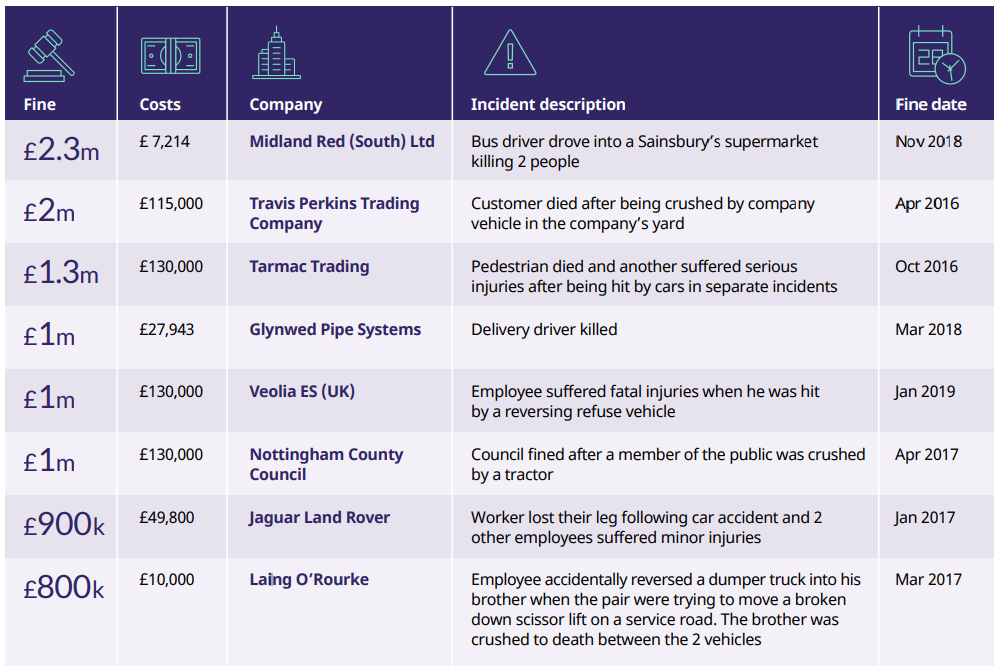Two railway welders died in a road traffic accident as a result of their employer, Renown Consultants Ltd, failing to ensure that they were sufficiently rested to work and travel safely.
Nottingham Crown Court heard that Zac Payne, 20, and Michael Morris, 48, died on 19 June 2013 when Payne fell asleep at the wheel of the work van and came off the motorway, crashing into a parked van, while driving back to Doncaster after a night shift in Stevenage.
The previous day Payne had left Doncaster at 4.30am and driven to Alnmouth, Northumberland, arriving at 7.30am to carry out work on the railway.
The expected work did not take place, so after waiting until midday Payne started the drive back to Renown’s Doncaster depot, arriving at 3pm.
On his way to the depot he was asked to take on an overnight railway welding job in Stevenage and, in company with Morris, they set off from the depot at 7.18pm arriving at the site at 9.47pm.
The two men then undertook welding jobs from 11.15pm leaving the site once they had finished at 3.40am.
The crash occurred at around 5.30am as Payne was driving back to Doncaster.
The Office of Rail and Road (ORR) told the court that Payne, who like his colleague was employed on a zero-hours contract, was suffering the effects of fatigue and may have fallen asleep at the wheel or experienced ‘microsleeps,’ which hugely increased the risk of a traffic accident.
The court was told that Network Rail had asked Renown for an additional welding team for the Stevenage job at 7.30am on 18 June and Renown had accepted the job before considering if it had sufficient well-rested employees and before speaking to Payne.
The company did not follow its own fatigue management procedures, nor did it comply with the working time limits for safety critical work, such as welding, which insist there should be a ‘minimum rest period of 12 hours between booking off from a turn of duty to booking on for the next’.
ORR found that Renown’s policies and procedures were particularly inadequate because employees were on zero hours contracts, and these contracts created an obvious incentive for employees to volunteer for work when they were too tired as they were only paid for the shifts they worked.
This was made worse as Payne, and other trainee welders, were reliant on Renown for securing the qualifications they needed to qualify as welders, which discouraged them for refusing shifts.
Ian Prosser, Chief Inspector of Railways said: “Our thoughts are with the family and friends of Mr Payne and Mr Morris.
“The rail industry relies on a huge workforce of skilled manual staff often working at night and on shifts. Fatigue is a real and known risk which reduces alertness and affects performance.
“Today’s tragic case shows the fatal consequences that can occur when fatigue policies are disregarded.
“Safety comes first and ORR will continue to monitor and take action where companies do not take sufficient care to ensure their workforce is not too tired to work.”
Renown Consultants Ltd was found guilty of safety breaches and will be sentenced at a later date.
Sentencing
On Friday 20th March 2020 Renown Consultants were found guilty by a jury at Nottingham Crown Court nearly seven years after the fatal crash.
The sentencing date is yet to be announced. However substantial penalties are expected due to Renown Consultants pleading not guilty.
Article sourced from Construction Enquirer.
Corporate manslaughter
One of the most high-profile pieces of recent legislation that concerns road safety is the Corporate Manslaughter and Corporate Homicide Act 2007.
Since the introduction of the Corporate Manslaughter and Corporate Homicide Act in 2007, there have been just over 25 convictions, of which 1 was directly related to Corporate Manslaughter (road safety).
This was Baldwins Crane Hire Ltd, where a driver, Lindsay Easton, died when driving a crane which crashed into an earth bank in 2011. The vehicle’s brakes had failed. The company was fined £700,000 plus costs in December 2015 and the incident was well publicised. However, several other laws also apply to the driving task.
For example, in January 2017 a haulage boss and his mechanic were both jailed after being found guilty of manslaughter when a tipper truck crashed in Bath killing 4 people following brake failure; the driver was cleared of dangerous and careless driving.
Secondly, in March 2017, the driver of a bin lorry, which crashed in Glasgow killing 6 people, was banned from the roads for 3 years after admitting ‘culpably and recklessly’ driving a vehicle (car) to the danger of the public.
Most recently, in November 2018, Midland Red (South) Ltd were fined £2.3 million under health and safety legislation, after a bus driver drove into a Sainsbury’s supermarket killing 2 people.
Change in Health and Safety fines 2016
For several years, the Corporate Manslaughter Act has been identified by many commentators as the most important legislation that affects road safety issues.
While very important, the most likely risk for most businesses is the major overhaul of health and safety fines and sentencing guidelines introduced in February 2016.
As a result, the size of health and safety fines has increased significantly since 2016. BLM, an insurance risk and commercial law firm, publishes a list of fines and costs incurred.
Here are some recent examples of the major fines related to road and driver risk.

- Companies must ensure they manage their duty of care with employees who drive for work.
- Tiredness and fatigue are physical and behavioural reasons that can easily be overlooked when considering duty of care towards road safety.
- Substantial penalties are expected when sentenced.
